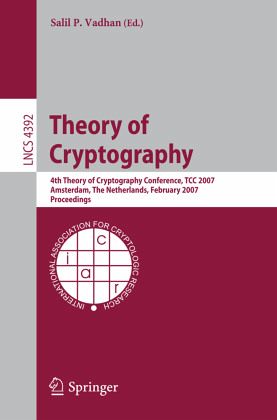
Theory of Cryptography
4th Theory of Cryptography Conference, TCC 2007, Amsterdam, The Netherlands, February 21-24, 2007, Proceedings
Herausgegeben: Vadhan, Salil P.

PAYBACK Punkte
38 °P sammeln!
Theory of Cryptography

4th Theory of Cryptography Conference, TCC 2007, Amsterdam, The Netherlands, February 21-24, 2007, Proceedings

Rechnungen
Bestellstatus
Retourenschein
Storno